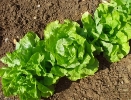New research by scientists in the Department of Biology at the University of York shows that species have responded to climate change up to three times faster than previously appreciated. These results are published in the latest issue of the leading scientific journal Science.
As a blistering drought continues to plague huge portions of Texas, a Texas Tech University researcher says that even now in the midst of the fight, it’s time to plan ahead and logically plot a path for pulling more than 90 million acres of valuable rangeland back from the brink.
The sobering study fount that Western Europe emits about twice as much HFC-23 as officially reported.
A growing body of recent research indicates that, in Earth's warming climate, there is no "tipping point," or threshold warm temperature, beyond which polar sea ice cannot recover if temperatures come back down. New University of Washington research indicates that even if Earth warmed enough to melt all polar sea ice, the ice could recover if the planet cooled again.
A new study shows that as climate change enhances tree growth in tropical forests, the resulting increase in litterfall could stimulate soil micro-organisms leading to a release of stored soil carbon.
Undergraduate researcher Safatul Islam is a member of a team in the College of Optical Sciences investigating organic photovoltaics, which can lead to improved electronics.
Lake Tahoe clarity dropped in 2010, but the rate of decline in clarity over the past decade remains slower compared with previous decades, according to UC Davis scientists who have monitored the lake for more than 40 years.
As the U.S. government makes decisions on high-profile environmental issues, Faisal Hossain’s influence on those decisions is growing—attesting to the fact that a researcher at a mid-size university in a rural area can have a powerful national, even international, impact.
Recent data from NSF-funded research in both Greenland and Antarctica demonstrate that fossil-fuel related emissions of both methane and ethane, two of the most abundant hydrocarbons in the atmosphere, declined at the end of the twentieth century, according to a paper published Thursday in the journal Nature.
Scientists from the U.S. Geological Survey will embark on a research cruise to the Arctic Ocean beginning today to collect water samples and other data to determine trends in ocean acidification from the least explored ocean in the world.
These findings point to climate change and variability working together equally to accelerate the observed sea ice loss during the late 20th century.
Rice University engineering researchers unveiled a new method for rapidly converting simple glucose into biofuels and petrochemical substitutes
The Ohio State researchers argue that in this case, as forests age, they get rejuvenated with younger individuals of different species – a more-complex and -diverse community will be replacing the old guard.
While geologists and economists debate the specifics, American University School of Communication professor Matthew Nisbet believes peak petroleum and the associated risks to public health may provide an opportunity to bring conservatives and liberals together in the move toward alternative forms of energy.
Under the comprehensive new national program, trucks and buses built in 2014 through 2018 will reduce oil consumption by a projected 530 million barrels and greenhouse gas (GHG) pollution by approximately 270 million metric tons.

New Zealand’s intense ultraviolet light may be bad for the skin, but it could provide a boost for vegetable production, according to new research by a Massey University crop scientist.
A new Web tool unveiled by NRDC lets users read how their state might be impacted by climate change.
New computer modeling work shows that by 2100, if society wants to limit carbon dioxide in the atmosphere to less than 40 percent higher than it is today, the lowest cost option is to use every available means of reducing emissions.
According to a new paper by researchers around the team of Sönke Zaehl from the Max Planck Institute for Biogeochemistry, nitrogen's detrimental effects on the climate roughly correspond to its climactic benefits. In fact, the scientists' findings suggest that the negative impacts of nitrogen may even slighty prevail.
New research published in the journal Biogeosciences provides a detailed account of how carbon naturally flows into and out of crops themselves as they grow, are harvested and are then eaten far from where they're grown. The paper shows how regions that depend on others to grow their food end up releasing the carbon that comes with those crops into the atmosphere.